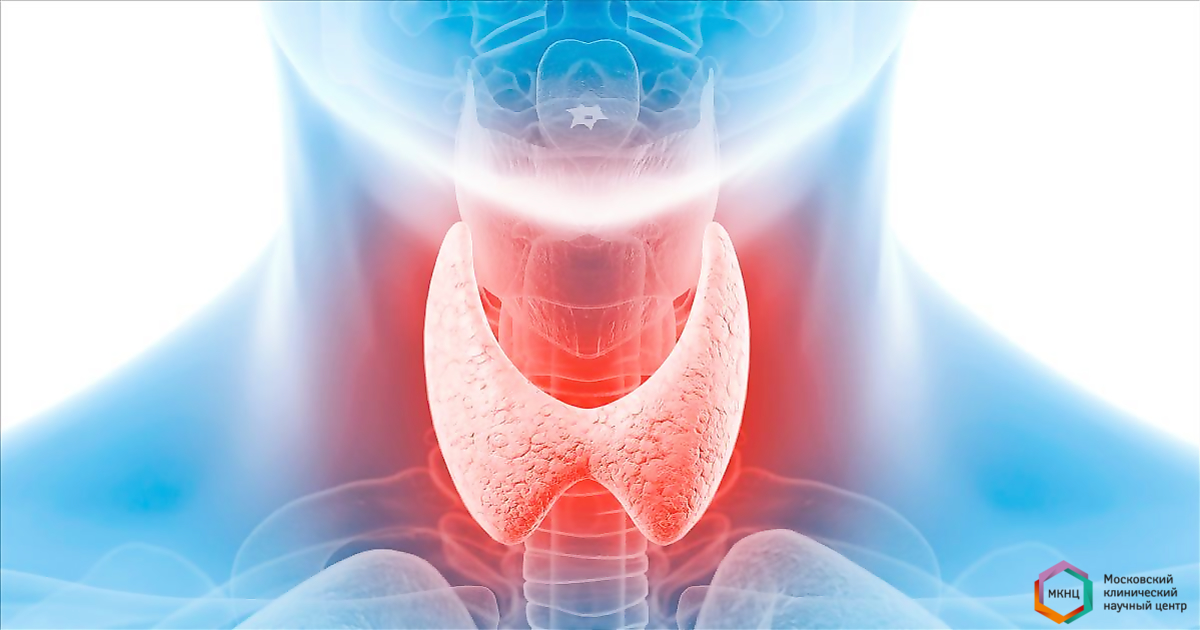Thyroid cancer
Thyroid cancer can be detected by a doctor accidentally during an examination and palpation of the neck in the form of a seal. Thyroid cancer is also detected on ultrasound in the form of a thyroid node. Often with thyroid cancer, there is a growth of the node, hoarseness of the voice. Thyroid cancer can only be treated surgically.

What is thyroid cancer?
Thyroid cancer occurs when normal thyroid cells are transformed into abnormal cells, which leads to their uncontrolled growth.
There are different types of thyroid cancer. Some of them are the most severe and serious.
What are the symptoms of thyroid cancer?
- At the beginning of the disease, patients do not notice any symptoms. Thyroid cancer can be diagnosed by a doctor accidentally during an examination and palpation of the neck with another disease.
When symptoms appear in thyroid cancer, the most common one is the growth of a previously identified thyroid node. Such growth usually progresses over a short period of time. In some cases, patients themselves notice or feel the growth of the thyroid gland. In other cases, the doctor determines the growth of the thyroid gland during a preventive examination.
Other symptoms of thyroid cancer include:
- Hoarse voice
- Shortness of breath
- Problems with swallowing
- Cough with or without blood
- dense palpable node of the thyroid gland
All of these symptoms may also correspond to a disease that is not thyroid cancer. But if you have these symptoms, contact your doctor immediately.
How is thyroid cancer diagnosed?
- If you have a growth of the thyroid gland, the doctor will prescribe tests and examinations in order to make sure whether such growth is associated with cancer or not. (Many thyroid growths are not cancers.) These surveys include:
- Ultrasound examination of the thyroid gland, in which ultrasound waves are used to create an image of the thyroid gland on the screen. For some patients with suspected radioiodine-sensitive metastases or medullary cancer, a radiopharmaceutical thyroid scan is used. The patient receives a tablet containing a radioactive substance, after which a special camera takes a picture of the thyroid gland;
- Blood tests;
- Fine needle aspiration puncture biopsy (TAPB). Under the control of ultrasound, a thin needle is inserted into the tumor. With its help, the surgeon takes a sample of the node tissue, which is then examined under a microscope.
Doctors also find out whether the cancer has spread to neighboring tissues and organs, and, if so, how much.
The right treatment for you will depend largely on the type of thyroid cancer that you have, its stage and whether you have concomitant diseases.
What are the ways to treat thyroid cancer?
- Thyroid cancer is treated only with surgery. After the operation, some other treatment methods may be additionally prescribed.
- Surgical method. In the vast majority of cases, thyroid cancer is treated with surgery to remove the cancer. The entire thyroid gland and the surrounding tissue with lymph nodes should be removed. Traditionally, the operation is performed from an incision in the neck, although there are also video-assisted methods of surgery.
- The patient receives radioactive iodine (also called "Radioiodine therapy") in the form of a solution of radioactive iodine. This uses a small amount of radiation, but destroys most of the cells the thyroid gland. The method is sometimes indicated after removal of the thyroid gland to kill possible metastases.
- Hormone therapy. Your doctor will prescribe you thyroid hormone medications after surgery or treatment with radioactive iodine. Thus, your body will contain the necessary amount of thyroid hormones.
- Radiation therapy. This treatment uses high doses of X-rays to kill the cancer cells. The radiation session lasts for several minutes and is absolutely painless.
- Chemotherapy. By this method of treatment, doctors mean the use of a group of drugs that kill cancer cells.
What happens after treatment?
After treatment, the doctor will check you frequently to make sure that there is no recurrence of cancer. Regular follow-up examinations include blood tests, visual examinations, etc. The doctor will also regularly prescribe blood tests to check the level of thyroid hormones.
You should also keep an eye out for the symptoms listed above. The presence of these symptoms may mean that the thyroid cancer has returned again. Tell your doctor if you experience any symptoms.

What happens if thyroid cancer reappears?
- If thyroid cancer reappears, they will use a more radical method of surgical treatment, large doses of radioactive iodine, high doses of radiation and chemotherapy.
What else should I do?
- It is very important to follow all the doctor's instructions. It is also important to talk to your doctor about any side effects or possible problems that may occur during treatment.
- In the initial stages, thyroid cancer is curable, and includes many treatment options. Always let your doctor know that you are serious about treatment. Every time you are offered one of the treatment options, ask:
- What are the benefits of this treatment? Will it prolong my life? Will the treatment reduce or prevent the symptoms?
- What are the disadvantages of such treatment?
- Are there any other options besides the recommended treatment?
- What happens if I don't agree to this treatment?
Diagnosis and treatment of thyroid diseases should take place with the participation of an endocrinologist, an endocrine surgeon and an oncologist in a specialized department.





